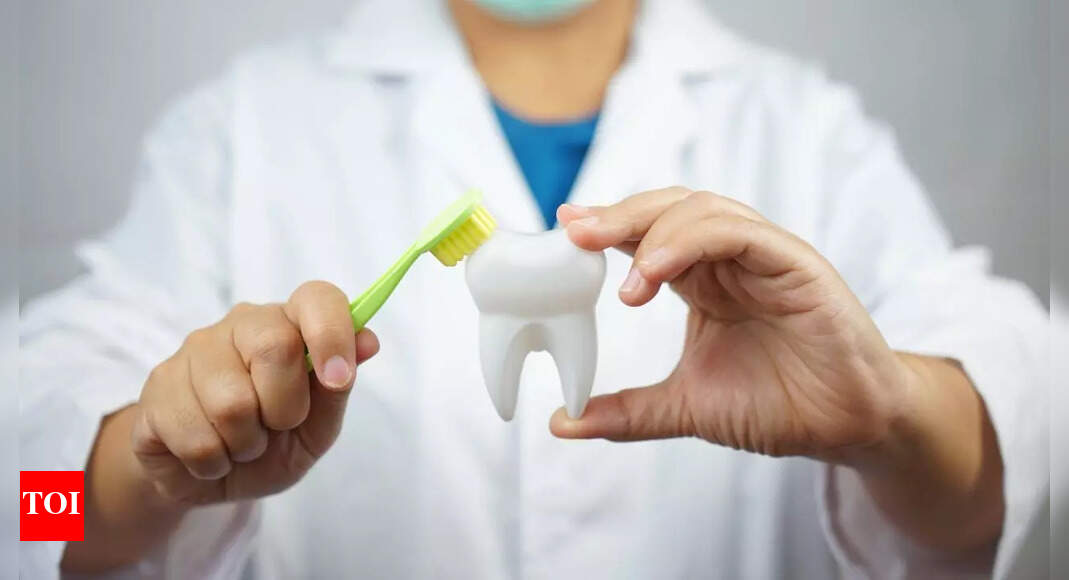How poor oral health can raise heart attack risk: The hidden role of mouth bacteria | – The Times of India

Many people focus on brushing and flossing to avoid cavities or bad breath, but oral health is about much more than a bright smile. Emerging evidence shows that the state of your mouth can have a direct impact on your heart. Harmful bacteria that thrive in poor oral hygiene may travel to the arteries, triggering inflammation and contributing to heart disease. While not every case of gum disease leads to heart problems, maintaining healthy teeth and gums could play a crucial role in protecting your cardiovascular system, making dental care a simple step toward long-term heart health.
Oral bacteria in arteries: How hidden microbes increase heart attack risk
A recent study titled “Viridans Streptococcal Biofilm Evades Immune Detection and Contributes to Inflammation and Rupture of Atherosclerotic Plaques” examined artery tissues from two groups: individuals who died suddenly of heart problems and patients undergoing surgery to remove arterial blockages. Researchers discovered that certain mouth bacteria, particularly viridans streptococci, can travel from the mouth to the arteries.
In the arteries, these bacteria often hide in biofilms, sticky protective layers that shield them from the immune system. While hidden, they go undetected, but if the biofilm breaks down or is triggered by another infection, the immune system reacts, causing inflammation. This inflammation can weaken the cap of arterial plaques. When a plaque ruptures, it can form blood clots that block blood flow, potentially leading to a heart attack.The study also found that these bacteria were more commonly present in advanced arterial disease, suggesting that oral microbes may play an increasingly significant role as heart problems progress. This highlights that oral health may directly influence cardiovascular health in ways we are only beginning to understand.
Gum disease and inflammation: Everyday impacts on heart health
Your mouth and your heart are connected more closely than most people realize. Conditions such as gum disease, plaque buildup, and infections can contribute to inflammation in the body, which may extend beyond the mouth to your arteries. Chronic inflammation is a key factor in heart disease, and oral bacteria may be one of the hidden triggers.Even simple issues like bad breath or minor gum irritation could be a warning sign that bacteria are affecting your overall health. While not everyone with poor oral hygiene will experience heart problems, taking care of your teeth may help reduce long-term cardiovascular risk.
Oral hygiene tips to protect your heart health
Maintaining good oral hygiene is one of the simplest ways to support both your mouth and your heart. Key steps include:
- Brushing teeth twice daily using fluoride toothpaste
- Flossing daily or using interdental brushes to remove hidden plaque
- Regular dental checkups and professional cleanings
- Promptly treating gum infections and other dental issue
- Limiting sugar intake to reduce bacterial growth
By following these habits, you reduce the chances of harmful bacteria thriving in your mouth, which in turn may help prevent inflammation in the arteries and lower the risk of plaque rupture.
Protecting your heart through dental care: Simple, effective steps
Taking care of your oral health is more than cosmetic, it’s a preventive strategy for heart health. Healthy teeth and gums may help keep arteries strong, reduce inflammation, and support overall cardiovascular wellness.While research is ongoing and causation has not been fully established, paying attention to your oral hygiene is a low-cost, simple way to protect your heart. Small daily actions like brushing, flossing, and regular dental visits are easy steps that could make a big difference in long-term heart health.In conclusion, maintaining good oral hygiene is not just about preventing cavities or bad breath. It may also be a key factor in reducing heart attack risk and keeping your cardiovascular system healthy. By treating your mouth well, you are also taking proactive care of your heart.Disclaimer: This article is for general informational purposes only and is not a substitute for professional medical advice, diagnosis, or treatment. Always seek the guidance of a qualified healthcare provider regarding any medical condition or lifestyle change.Also Read: Orange juice for heart health: How daily drinking may lower cholesterol and blood pressure
var _mfq = window._mfq || [];
_mfq.push([“setVariable”, “toi_titan”, window.location.href]);
!(function(f, b, e, v, n, t, s) {
function loadFBEvents(isFBCampaignActive) {
if (!isFBCampaignActive) {
return;
}
(function(f, b, e, v, n, t, s) {
if (f.fbq) return;
n = f.fbq = function() {
n.callMethod ? n.callMethod(…arguments) : n.queue.push(arguments);
};
if (!f._fbq) f._fbq = n;
n.push = n;
n.loaded = !0;
n.version = ‘2.0’;
n.queue = [];
t = b.createElement(e);
t.async = !0;
t.defer = !0;
t.src = v;
s = b.getElementsByTagName(e)[0];
s.parentNode.insertBefore(t, s);
})(f, b, e, ‘https://connect.facebook.net/en_US/fbevents.js’, n, t, s);
fbq(‘init’, ‘593671331875494’);
fbq(‘track’, ‘PageView’);
};
function loadGtagEvents(isGoogleCampaignActive) {
if (!isGoogleCampaignActive) {
return;
}
var id = document.getElementById(‘toi-plus-google-campaign’);
if (id) {
return;
}
(function(f, b, e, v, n, t, s) {
t = b.createElement(e);
t.async = !0;
t.defer = !0;
t.src = v;
t.id = ‘toi-plus-google-campaign’;
s = b.getElementsByTagName(e)[0];
s.parentNode.insertBefore(t, s);
})(f, b, e, ‘https://www.googletagmanager.com/gtag/js?id=AW-877820074’, n, t, s);
};
function loadSurvicateJs(allowedSurvicateSections = []){
const section = window.location.pathname.split(‘/’)[1]
const isHomePageAllowed = window.location.pathname === ‘/’ && allowedSurvicateSections.includes(‘homepage’)
const ifAllowedOnAllPages = allowedSurvicateSections && allowedSurvicateSections.includes(‘all’);
if(allowedSurvicateSections.includes(section) || isHomePageAllowed || ifAllowedOnAllPages){
(function(w) {
function setAttributes() {
var prime_user_status = window.isPrime ? ‘paid’ : ‘free’ ;
var geoLocation = window?.geoinfo?.CountryCode ? window?.geoinfo?.CountryCode : ‘IN’ ;
w._sva.setVisitorTraits({
toi_user_subscription_status : prime_user_status,
toi_user_geolocation : geoLocation
});
}
if (w._sva && w._sva.setVisitorTraits) {
setAttributes();
} else {
w.addEventListener(“SurvicateReady”, setAttributes);
}
var s = document.createElement(‘script’);
s.src=”https://survey.survicate.com/workspaces/0be6ae9845d14a7c8ff08a7a00bd9b21/web_surveys.js”;
s.async = true;
var e = document.getElementsByTagName(‘script’)[0];
e.parentNode.insertBefore(s, e);
})(window);
}
}
window.TimesApps = window.TimesApps || {};
var TimesApps = window.TimesApps;
TimesApps.toiPlusEvents = function(config) {
var isConfigAvailable = “toiplus_site_settings” in f && “isFBCampaignActive” in f.toiplus_site_settings && “isGoogleCampaignActive” in f.toiplus_site_settings;
var isPrimeUser = window.isPrime;
var isPrimeUserLayout = window.isPrimeUserLayout;
if (isConfigAvailable && !isPrimeUser) {
loadGtagEvents(f.toiplus_site_settings.isGoogleCampaignActive);
loadFBEvents(f.toiplus_site_settings.isFBCampaignActive);
loadSurvicateJs(f.toiplus_site_settings.allowedSurvicateSections);
} else {
var JarvisUrl=”https://jarvis.indiatimes.com/v1/feeds/toi_plus/site_settings/643526e21443833f0c454615?db_env=published”;
window.getFromClient(JarvisUrl, function(config){
if (config) {
const allowedSectionSuricate = (isPrimeUserLayout) ? config?.allowedSurvicatePrimeSections : config?.allowedSurvicateSections
loadGtagEvents(config?.isGoogleCampaignActive);
loadFBEvents(config?.isFBCampaignActive);
loadSurvicateJs(allowedSectionSuricate);
}
})
}
};
})(
window,
document,
‘script’,
);
[title_words_as_hashtags



